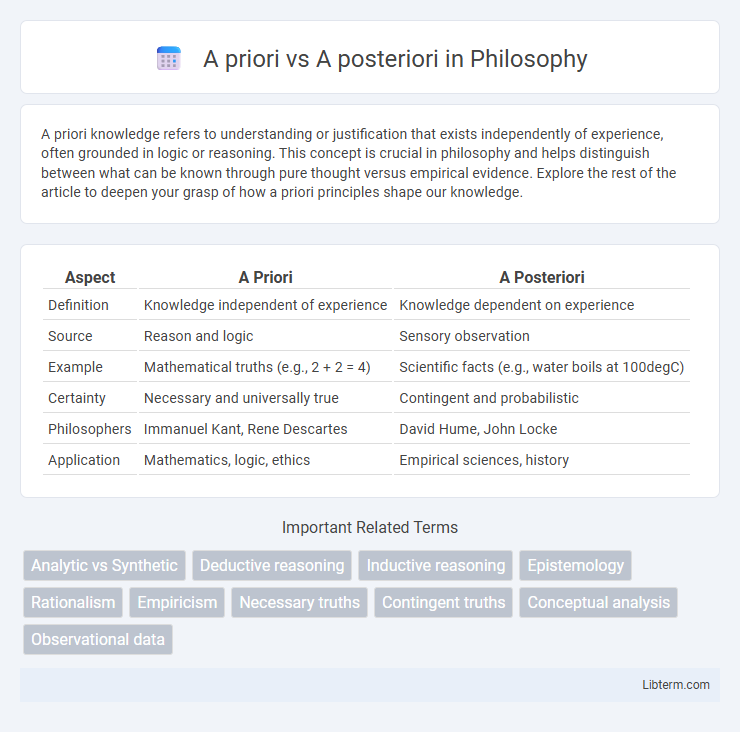A priori knowledge refers to understanding or justification that exists independently of experience, often grounded in logic or reasoning. This concept is crucial in philosophy and helps distinguish between what can be known through pure thought versus empirical evidence. Explore the rest of the article to deepen your grasp of how a priori principles shape our knowledge.
Table of Comparison
| Aspect | A Priori | A Posteriori |
|---|---|---|
| Definition | Knowledge independent of experience | Knowledge dependent on experience |
| Source | Reason and logic | Sensory observation |
| Example | Mathematical truths (e.g., 2 + 2 = 4) | Scientific facts (e.g., water boils at 100degC) |
| Certainty | Necessary and universally true | Contingent and probabilistic |
| Philosophers | Immanuel Kant, Rene Descartes | David Hume, John Locke |
| Application | Mathematics, logic, ethics | Empirical sciences, history |
Introduction to A Priori and A Posteriori
A priori knowledge is independent of experience and relies on logical deduction and innate understanding, such as mathematical truths and tautologies. A posteriori knowledge depends on empirical evidence gained through sensory experience and observation, forming the foundation for scientific inquiry and inductive reasoning. Distinguishing between these epistemological categories clarifies how knowledge is acquired and validated in philosophy and cognitive sciences.
Defining A Priori Knowledge
A priori knowledge is independent of sensory experience and is derived through reason or logical deduction, such as mathematical truths and tautologies. This type of knowledge is necessary and universally applicable, existing prior to or without empirical evidence. It contrasts with a posteriori knowledge, which depends on observation and experience to be validated.
Understanding A Posteriori Knowledge
A posteriori knowledge derives from empirical evidence and sensory experience, making it contingent on observation and experimentation for validation. This type of knowledge contrasts with a priori knowledge, which is independent of experience and based solely on logical reasoning or innate concepts. Understanding a posteriori knowledge is crucial in scientific methods where hypotheses are tested and conclusions are drawn from data collected through observation or experimentation.
Key Differences Between A Priori and A Posteriori
A priori knowledge is derived independently of experience, relying on logic and reasoning, while a posteriori knowledge depends on empirical evidence and sensory experience. A priori propositions are necessarily true and universally applicable, whereas a posteriori statements are contingent and subject to verification or falsification through observation. The distinction is crucial in epistemology for understanding the sources and justification of human knowledge.
Historical Context and Philosophical Foundations
A priori knowledge, rooted in rationalist traditions like those of Descartes and Kant, is understood as knowledge independent of experience, relying on innate ideas and deductive reasoning. In contrast, a posteriori knowledge arises from empirical observation and sensory experience, emphasized by empiricists such as Locke, Hume, and Berkeley. The philosophical foundations of this distinction are central to epistemology, shaping debates on the sources and limits of human knowledge since the early modern period.
Examples of A Priori Reasoning
A priori reasoning involves knowledge or justification independent of experience, such as mathematical truths like "2 + 2 = 4" and logical deductions including "all bachelors are unmarried." Philosophical examples include Kant's assertion that certain concepts, like space and time, are a priori intuitions inherent in human cognition. These instances highlight how a priori knowledge is derived through reasoning alone, without empirical evidence.
Examples of A Posteriori Reasoning
A posteriori reasoning relies on empirical evidence and sensory experience to draw conclusions, such as observing that the sky is cloudy and predicting rain. Scientific experiments provide examples, where data collected through observation or measurement leads to theories or laws, like Mendel's genetic inheritance studies. Everyday decisions, like choosing a route based on traffic reports, demonstrate a posteriori reasoning grounded in real-world information.
Applications in Epistemology
A priori knowledge, derived from reason and independent of experience, underpins foundational concepts in epistemology such as logic and mathematics, providing certainty without empirical evidence. A posteriori knowledge, based on empirical observation and experience, is essential for scientific inquiry and the evaluation of hypotheses through sensory data. The interplay of a priori and a posteriori methods allows epistemologists to distinguish between necessary truths and contingent knowledge, shaping theories of justification and belief formation.
Relevance in Science and Mathematics
A priori knowledge in science and mathematics refers to information derived through logical reasoning or theoretical deduction without relying on empirical evidence, making it crucial for forming foundational principles and hypotheses. A posteriori knowledge depends on sensory experience and observation, providing validation and refinement of theories through experimental data and real-world testing. This distinction ensures scientific methods balance theoretical frameworks with empirical validation, enhancing the robustness and reliability of conclusions.
Conclusion: Impact on Knowledge and Understanding
A priori knowledge, derived from reasoning independent of experience, provides foundational certainty and necessary truths, shaping logical frameworks and mathematical principles. A posteriori knowledge, grounded in empirical evidence and sensory experience, drives scientific discovery and adaptation to new information. The interplay between a priori and a posteriori reasoning enhances comprehensive understanding by balancing abstract concepts with real-world validation.
A priori Infographic

 libterm.com
libterm.com